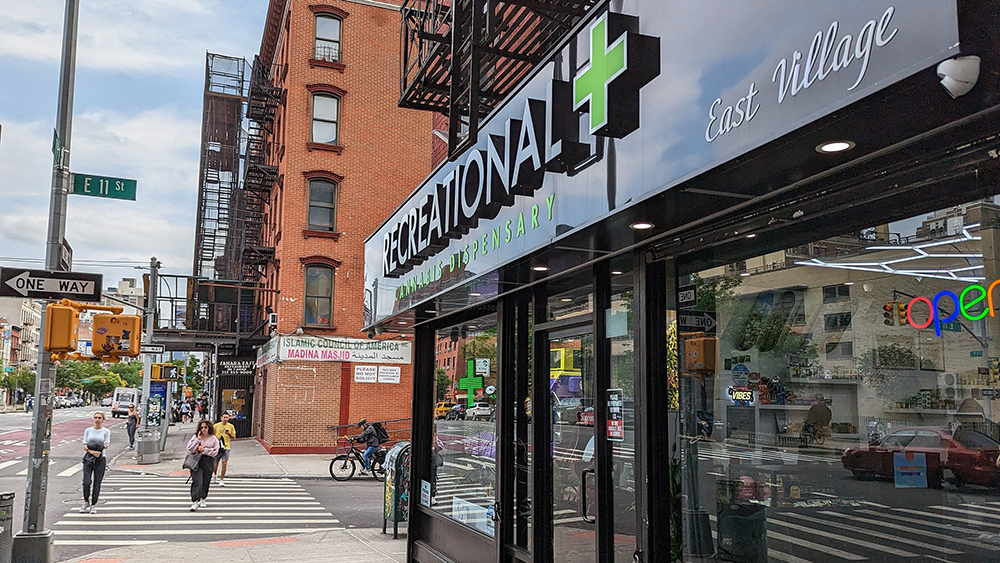
FOREST HILLS — A legally licensed dispensary selling medical marijuana is just four blocks from Our Lady Queen of Martyrs Church, but the pastor, Father Francis Passenant, isn’t worried about that close proximity. He has other concerns.
“It’s not on our doorstep,” he said. Therefore, it is not in the normal paths of the students who attend the parish’s Catholic academy.
“I am more concerned that they pass by the illegal ones,” Father Passenant said. “Anything goes if it’s the illegal kind, and they’re getting away with anything.”
He is not alone. Mayor Eric Adams fumed early this year that an estimated 1,500-2,000 unlicensed weed shops opened in the city since sales and possession of “adult-use” cannabis became legal in 2021.
That’s when the state legislature passed the Marijuana Regulation & Taxation Act (MRTA) to provide a means for licensed vendors to legally serve consumers while also generating tax revenue.
So far, 26 vendors have received licenses statewide to sell “adult-use,” also known as recreational marijuana. Many are in New York City.
The New York Office of Cannabis Management (OCM) has indicated a willingness to settle a lawsuit that claims the state gave priority to adult-use sales licenses to existing dealers over disabled veterans seeking to enter the legal market.
If approved, the settlement would clear the way for more license approvals.
Any new legal shops are in addition to the 40 medical cannabis dispensaries licensed in the state. There are three in Brooklyn and four in Queens, including the Forest Hills dispensary run by the worldwide company, Curaleaf.
Still, unlicensed “pop-up” shops serve an enormous consumer demand, effectively taking illicit drug trafficking out of back alleys and vacant doorways to active storefronts in commercially zoned areas.
On Oct. 30, the State Senate’s Cannabis Committee held a daylong meeting in Albany to discuss the problem.
New York City Council Member Gale Brewer testified via video conferencing. She said her District 6 on the Upper West Side now has the nickname “Upper Weed Side” because of its many unlicensed pop-up shops.
Brewer described accompanying City Sheriff Anthony Miranda during “a day of enforcement” in the district.
They confiscated thousands of products from three stores, she said, adding that one even concealed its wares behind a trapdoor. Still, the store later re-stocked and resumed business.
It is still open, Brewer said of the shop at 87th Street and Columbus Avenue. “I know because it’s across the street from my district office.”
At another location, she said, officials raided a shop on West 55th Street, issued it two citations, and placed a sticker on the window that stated, “Illicit Cannabis Seized.”
“According to the block association, the sticker was removed the next day, and the store is back to selling cannabis,” Brewer said.
Sheriff Miranda also testified. He said the stores selling unlicensed cannabis frequently violate rules controlling the sale of other products, including electronic cigarettes.
They don’t pay taxes and they shun other rules, like selling cannabis products to minors. And without regulatory oversight, these products could be cut with dangerous adulterants like fentanyl.
State Sen. Mario Mattera of Smithtown on Long Island asked if “no-cash bail” contributed to the problem.
The sheriff said bail is a factor involved in criminal proceedings. His office, however, is charged with civil actions, such as inspections, citations, and confiscations of goods.
Many of these operators consider fines, shutdowns, and confiscations of their products as the costs of doing business. They’re back to work as soon as they pay the fines. Then they amass profits until the next inspection.
Still, Brewer noted, pop-up shop operators are also victims. Nearly 600 robberies occurred at smoke shops in the city in 2022, a 137% hike over 2021.
Two men died recently in shootings at smoke shops, according to the New York Daily News.
On Nov. 15, a man died of gunshot wounds outside a shop on West 116th Street in Harlem, the newspaper reported.
On Nov. 10 a man pointed a pistol at the man working behind the counter at a smoke shop on East Tremont Avenue in the Bronx. The clerk opened fire with his own gun, killing the would-be robber. He was arraigned on gun charges, the Daily News reported.
Sheriff Miranda, like Brewer, said a more organized multi-agency approach is needed to eliminate the illegal shops.
He said prosecutors, local police, and agents assigned to the OCM all want to crack down on the illegal shops, but these agencies all have different roles.
For example, the OCM is empowered through the State Department of Taxation and Finance. The NYPD, meanwhile, responds to smoke shops in cases of actual criminal activity.
Sheriff Miranda suggested the Legislature draft new laws creating a “uniform set of robust tools” which all agencies could use to thwart illegal cannabis retailers. Brewer, meanwhile, urged cops to keep after criminal activity in and around the shops.
“Possession of more than five pounds of cannabis is a felony,” she said. “Sale to a minor is a felony.”
Brewer also noted that liquor stores can’t operate within 200 feet of a school, but illegal smoke shops often do. “Students are purchasing and vaping cannabis products in school,” she said. “This is very upsetting to me.”
Back in Forest Hills, Father Passenant suggested that even a highly regulated cannabis industry is not good for society.
He said he was shocked that MRTA received so much praise when it became law, which made him recall the 13 years he spent as a chaplain on Rikers Island.
“I would always ask, ‘What was your drug of entry into this business?’” he said. “And then 99 out of 100 times it was pot.
“This is not what our Lord would want, to ruin the temple of the Holy Spirit — the body,” the pastor said. “There are all kinds of warnings: don’t smoke or don’t drink. But there’s no warnings on this stuff. It might be pleasure, but it’s not happiness.”
